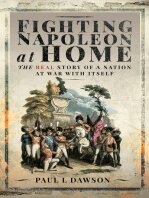

Most ebook files are in PDF format, so you can easily read them using various software such as Foxit Reader or directly on the Google Chrome browser.
Some ebook files are released by publishers in other formats such as .awz, .mobi, .epub, .fb2, etc. You may need to install specific software to read these formats on mobile/PC, such as Calibre.
Please read the tutorial at this link: https://ebookbell.com/faq
We offer FREE conversion to the popular formats you request; however, this may take some time. Therefore, right after payment, please email us, and we will try to provide the service as quickly as possible.
For some exceptional file formats or broken links (if any), please refrain from opening any disputes. Instead, email us first, and we will try to assist within a maximum of 6 hours.
EbookBell Team

4.7
56 reviewsThe great successes of Wellington and Nelson, and the glamour of Regency London, cover over the cracks of a divided society, of riots across the industrial north and widespread political opposition. Huge swathes of the country hated the war, booed and hissed at soldiers and ‘lobbed turds’ at the Scots Greys in Halifax. There were repeated ‘Peace Petitions’ which sought to stop the war – and even to prevent the British Army fighting at Waterloo.
Armed Associations of gentlemen volunteers and Local Militias led the call to close down the debate on social and democratic reform, while on the other hand thousands of English reformers heeded the call from France and hundreds actually headed to France, with many thousands more believing that the time had come, when its young men were needed to fight for King and Country, for reform.
The burgeoning middle class had no vote in parliament; rapidly expanding industrial towns and cities had no MPs, yet small villages – pocket boroughs – often had two. The burden of taxation fell on those least able to afford it; enclosure of common land; corn laws; restrictions on the freedom of expression; the endless killing, all fed into an undercurrent of political dissent that was ideologically opposed to the loyalist cause. It was a battle for the very sole of Britain.
For the first time, the shocking reality of life in Britain, during what is often portrayed as being its greatest era, is told through diaries, letters, and newspaper comments.